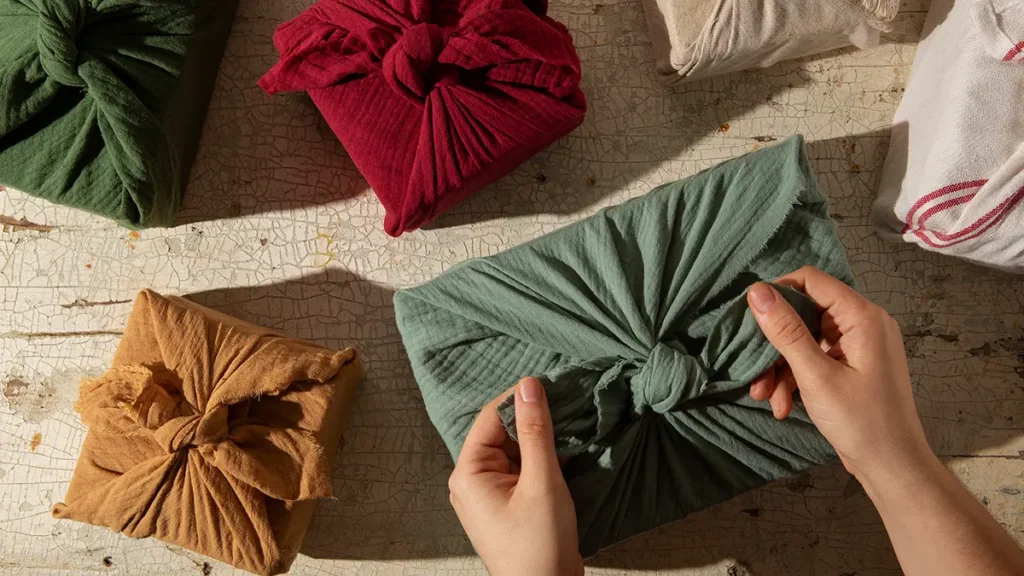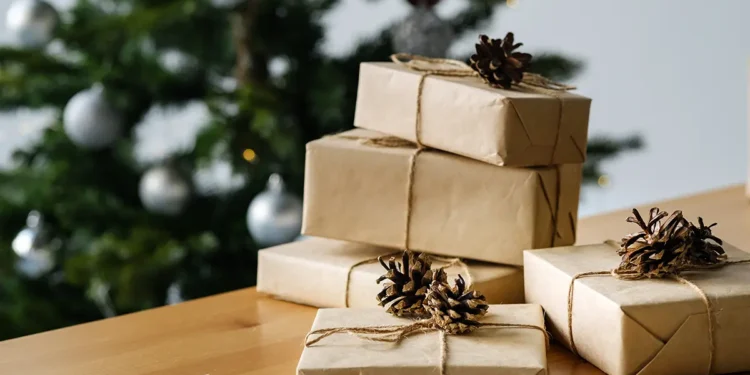The festive season is traditionally a time filled with joy, love, and celebration, marked by an air of warmth and togetherness. This is the period when families and friends come together, relishing in each other’s company, and sharing in the time-honoured tradition of exchanging gifts. These gifts, ranging from the simple to the extravagant, are more than just objects; they are tangible expressions of appreciation, love, and affection. However, beneath the surface of these cherished festivities, there lurks a less visible but increasingly significant issue: the environmental impact of holiday waste.
The Problem with Festive Waste
Envision this: mountains of wrapping paper, countless discarded gift boxes, and heaps of plastic packaging, all destined for landfills already struggling under the weight of our consumption. Each festive season, our celebratory habits inadvertently contribute to this growing environmental burden. This issue is further compounded by the fact that much of this waste is non-biodegradable, lingering in our environment long after the holiday cheer has faded. The stark reality of this situation underscores an urgent need for change, particularly in how we approach the act of gifting. It’s time for a paradigm shift towards eco-friendly gifting methods that align with our increasing environmental consciousness.
Eco-Friendly Wrapping Solutions
Furoshiki Wrapping: Drawing inspiration from the age-old Japanese art of ‘Furoshiki’, cloth wraps emerge as a sustainable and aesthetically appealing solution for gift wrapping. These reusable cloths not only reduce waste but also add an element of unique style to gift presentation. Embracing Furoshiki is a step towards greener, more mindful celebrations.
Recycled Wrapping Paper: Choosing recycled wrapping paper or opting for brown kraft paper transcends mere environmental responsibility. It represents a commitment to elegance and a deeper dedication to preserving our planet’s forests. By selecting these options, we actively contribute to the reduction of deforestation, ensuring a healthier planet for future generations.
Choosing Sustainable Gifts
In a world increasingly conscious of environmental impact, the choice of gifts we give speaks volumes. By selecting fewer but higher-quality items over a multitude of smaller, often disposable gifts, we can significantly lessen the waste generated during the festive season. When shopping for gifts, seeking out brands that are dedicated to sustainable and ethical operations becomes more than a personal choice; it becomes a statement of our values and a contribution towards environmental preservation.
Alternative Gifting Ideas
Why limit ourselves to tangible items when the realm of experiences awaits? Gifting experiences, be it cooking classes, visits to local museums, or rejuvenating spa days, offer a memorable alternative to traditional gifts. These experiences foster unique memories and connections, all while circumventing the environmental impact typically associated with physical gifts.
Combating Consumerism
In an era of rampant consumerism, setting a budget is more than just a financial decision; it’s an environmental one. By establishing clear financial boundaries, we not only safeguard our wallets but also encourage a more thoughtful approach to gifting. Reflecting on the necessity, utility, and emotional value of each gift can lead to more meaningful, heartfelt choices that resonate with the recipients and contribute less to the cycle of waste.

The Beauty of Minimalism
Embracing a minimalist approach to Christmas is not just a trend; it’s a meaningful shift in focus. A minimalist Christmas places a greater emphasis on relationships and togetherness, rather than on the sheer volume of material goods. This approach is about cherishing the warmth of shared experiences and creating special moments that live in memory rather than filling our spaces with an abundance of objects. It’s about understanding that the value of the festive season lies not in the number of presents under the tree, but in the quality of time spent with loved ones. This minimalist ethos encourages us to step back and appreciate the true essence of the holiday spirit: connection, gratitude, and love.
DIY Eco-Friendly Decorations
The festive season presents a perfect opportunity to get creative with homemade decorations. Engaging in DIY projects not only sparks creativity but also allows for a more personal and eco-friendly touch to your festive decor. Utilising natural materials like pine cones, branches, and dried fruits, or repurposing items like old fabrics and jars, can transform your space into a unique and environmentally conscious haven. This hands-on approach not only reduces the carbon footprint associated with store-bought decorations but also adds a charming, rustic appeal to your festive ambiance.
Sustainable Holiday Meals
When planning holiday meals, incorporating sustainability can significantly reduce our environmental impact. Opting for locally sourced ingredients supports local farmers and reduces the carbon footprint associated with long-distance food transportation. Emphasising plant-based dishes can also be a more eco-friendly option, as it generally requires less energy and resources to produce. Minimising food waste by carefully planning meal sizes and storing leftovers effectively is another key aspect of sustainable festive dining. These mindful practices contribute to a celebration that’s not only delicious but also kind to our planet.
Educating Others on Eco-Friendly Practices
One of the most powerful aspects of adopting eco-friendly practices is the potential to influence others. Sharing knowledge and experiences related to sustainable living with friends and family can have a ripple effect, inspiring more people to make eco-conscious choices. Whether it’s discussing the benefits of minimalism, the joy of DIY decorations, or tips for a sustainable feast, each conversation is a step towards a collective movement for a greener future.
Reflecting on Our Impact
It’s crucial to take a moment to reflect on the broader implications of our festive habits on the environment. Every choice we make, no matter how small, contributes to a larger impact on our planet. Whether it’s choosing a reusable wrap, opting for a handmade gift, or preparing a sustainable meal, each decision helps in shaping a more eco-friendly world. This reflection not only heightens our awareness but also reinforces our commitment to making positive changes.
As we embrace the festive season, let’s recommit ourselves to choices that respect and honour both the spirit of the season and the well-being of our planet. Transforming our holiday practices into eco-friendly joy isn’t just about making one-off changes; it’s about adopting a mindset that values sustainability and mindfulness. Let’s unwrap a greener Christmas, one choice at a time, and celebrate in a way that ensures our planet remains joyful and vibrant for many seasons to come.
FAQs
- What is Furoshiki wrapping? Furoshiki wrapping involves using cloth to elegantly wrap gifts, a practice that is both sustainable and aesthetically pleasing.
- How can I minimise waste during the festive season? Opt for reusable or recycled wrapping materials, choose sustainable gifts, and consider gifting experiences instead of physical items.
- What are some eco-friendly decoration ideas? Use natural materials like pinecones and branches or repurpose old decorations to create a sustainable festive atmosphere.
- How can I avoid consumerism during Christmas? Establish a budget, prioritise meaningful gifts over quantity, and embrace the joy of spending time with loved ones over material possessions.
- Can a minimalist approach enhance the festive season? Absolutely. A minimalist approach focuses on quality over quantity, emphasising the importance of togetherness and shared experiences.










